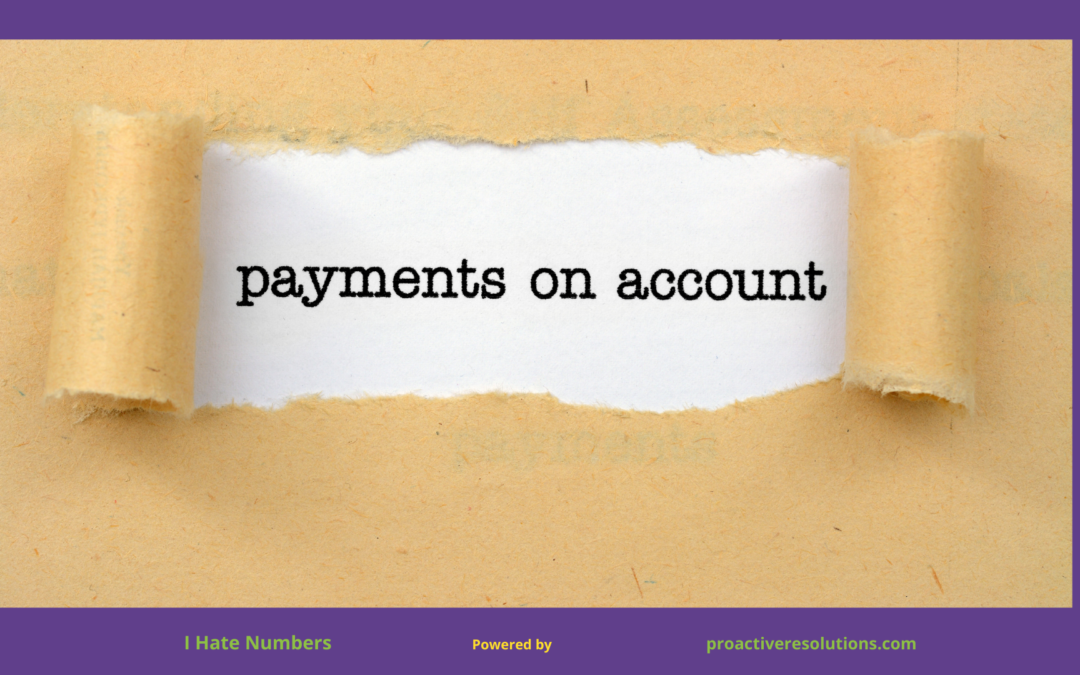Calling UK taxpayers, be aware of the self-assessment payments on account. If you are not prepared, then this will a nasty shock to your bank balance. As well as your stress levels!
I have got you covered. I’m going to talk about:
- What the payment on account is
- How it is calculated
- When you have to make the payments
- Reducing your payments on account
- Planning and budgeting for your tax
- FREE online tax calculator
Read on if you work for yourself, get money that hasn’t been taxed when received. This vlog-blog is for you
You don’t have to pay tax on money as it comes in. However that doesn’t mean you can ignore the taxman altogether! It highlights the importance of putting aside enough money for your tax bill and the value of filing your Self-Assessment tax return as early as possible. Especially if you are newly self-employed – to avoid any nasty surprises come payment time.
Whilst these payments are not an outright deduction from your current year’s profits, they will reduce what you owe in tax at the end of the year.
What are payments on account?
This is money you pay to HMRC on top of your personal tax bill. The idea behind payments on account is that you’ll have paid some of your taxes in advance when they’re due. They are advance payments towards your next tax bill.
If you owe money at the end, then HMRC will chase up any outstanding debts with interest added.
When do you have to make payments on account?
You must make 2 payments on account every year unless:
- Your last Self-Assessment tax bill was less than £1,000
- You’ve already paid more than 80% of all the tax you owe, for example through your tax code or because your bank has already deducted interest on your savings
How the payment is calculated
Firstly, if you owe more than £1,000 for a tax year, then the automatic assumption is that on top of this you pay the same again towards next year’s tax bill. For example, your tax bill for the 2020 to 2021 tax year is £4,000. On top of this you will pay an extra £4,000 as your payment on account!
Two things to calm the nerves. Firstly, it’s an assumption, but in the words of Angela Ahrendts, ask questions; don’t make assumptions. Secondly, your payments on account are paid in two equal instalments. In date terms, that’s by midnight 31 January and 31 July following the end of the tax year of assessment.
Each payment is half of the previous year’s tax bill which means that they’re not too much to pay off at once! Check back to the example above. The £4,000 is paid in two equal instalments of £2,000 each by midnight 31 Jan-22 and 31-July-22. If you still have tax to pay after you’ve made your payments on account, you must make a ‘balancing payment’ by midnight on 31 January next year.
Reducing your payments on account
The good news is that you can make a claim to reduce your payments on account if you believe that your tax bill will be less in the following tax year. Check back to the example above. If tax in 2021-22 will be less than 220-21 then reduce away.
However, if you make the claim and it turns out next year’s tax bill is at least the same as this year’s then interest will be charged, and possible penalties!
It’s important to know how much your payment on account will be, so you can plan. HMRC estimates that the size of your payment on account is based on your previous year’s tax bill. That means if you earn more in the next year, then HMRC assumes that you will pay more in taxes and vice versa.
If you know your tax bill is going to be lower than last year, you can ask HM Revenue and Customs (HMRC) to reduce your payments on account. You can do this either online or by post.
Budgeting for your tax
The HMRC payments on account highlight the importance of
- filing your Self-Assessment as early as possible
- Budgeting for your tax bill
Payments on account do not include anything you owe for capital gains or student loans (if you’re self-employed) – you’ll pay those in your ‘balancing payment’.
You don’t want to get caught out with an unexpected large sum due later! Click here now and use our handy FREE online calculator tool to see what size of payment is required!
Example of payments on account and balancing payment in action
Rishi has been self-employed for a few years. His tax bill for the 2020 to 2021 tax year is £4,000. Based on his last tax return for 2019-20 he made 2 payments on account of £800 each (£1,600 in total).
Rishi will need to pay a total tax bill of £4,400 by midnight on 31 January 2022. This includes:
- Rishis ‘balancing payment’ of £2,400 for the 2020 to 2021 tax year (£4,000 minus £1,600)
- His first payment on account of £2,000 (half his 2020 to 2021 tax bill). This goes towards your 2021 to 2022 tax bill
Rishi will make a second payment on account of £2,000 on 31 July 2022, unless he reckons that his 2021-22 tax bill will be less than 2020-21. If so, he can reduce his two HMRC payments on account of £2,000.
Conclusion
Get in touch with us to see how we can help you with figuring out your tax matters, your tax and other accounting and business matters. For more business and finance , news, advice and tips, don’t forget to watch our weekly broadcasts, listen to our weekly podcast I Hate Numbers.
